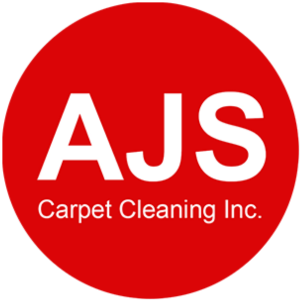Problems Encountered with Upholstery Cleaning
Introduction
Upholstery cleaning must be done with much more care and attention to detail than carpet cleaning. This is because upholstery fabrics are more delicate and prone to damage than carpets. Fabrics for furniture coverings are manufactured from a multitude of blends.
Some are woven, others are knitted, some are 100% cotton, some are synthetic blends. Most fabrics are made from a combination of cotton, wool, and synthetics. These fibers have different characteristics. Wool is durable and can last for years. Cotton is breathable and absorbent. Synthetics are resistant to moisture and mildew. Some upholstery fabrics are stain resistant, while others are not. This means that certain stains may become permanent fixtures on the upholstery fabric if you leave them alone.
Upholstery is designed primarily for decorative and aesthetic value rather than durability. It is estimated that most upholstery fabrics will wear out after about 8 years, while carpets will last for more than 20 years on average.
So, upholstery cleaners need to prioritize safety over cleaning efficiency. The highest grade of cleaning chemicals must be used. And upholstery cleaning technicians must be well trained in recognizing fiber types and handling problems encountered during upholstery cleaning.
Some of these problems are described below:
https://youtu.be/fOuoM50o94c
Bleeding
Different types of dyes and different kinds of fabric may be incorporated into an upholstery fabric blend. Bleeding or running of a color happens when one type of dye from a fiber is loosened during the cleaning process and sets into the color of another fiber.
Normally an alkaline type cleaner will induce bleeding while an acidic solvent will set the dyes. Red and blue colors are most apt to bleed. Any combinations of these two and especially black, will also be prone to bleeding.
Care must always be taken to avoid bleeding. Test for bleeding in an inconspicuous area.
Upholstery cleaning solutions should be just mildly alkaline, and should be followed with a slightly acidic rinse and quick drying to mitigate bleeding.
Browning
Browning or color change may be caused by several different factors, after fabric cleaning. Some types of dyes used in upholstery fabrics may actually change color with a change in the pH of the cleaning solutions. These are known as indicator dyes. This kind of color change is easily corrected by reversing the pH of the cleaning solution used.
Vegetable dyes in the fabric may also be loosened during cleaning. They will then wick to the surface during drying.
Perhaps the most common type of browning is known as cellulosic browning.
Fabric that is blended with cellulose, like cotton, rayon, acetate, linen, etc., may brown during cleaning. This is especially true when the fabric is old and light colored.
Cellulosic browning is caused by the reaction of cellulose in the presence of strong alkalis. It is corrected by acidification combined with fast drying.
The main factors that induce browning are:
- Water (over wetting)
- High Alkalinity
- Slow Drying
Whenever browning occurs, these three factors are usually present.
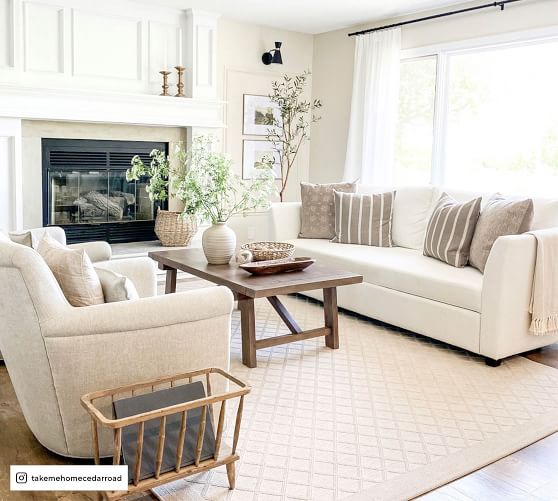
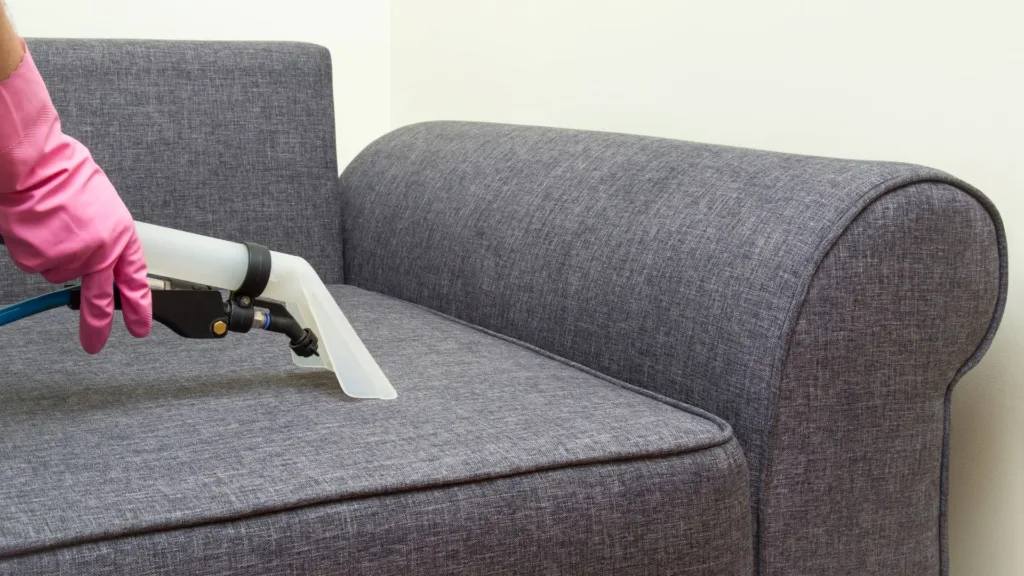
Fading
Fine fabrics like polished cotton and chintz are most likely to be affected by fading and dye transfer in the dry state. That is because they are usually colored by a printed dye process. The prints are simply surface dyes that easily gets abraded by normal wear. Exposure to sunlight causes them to fade.
Excessive agitation during upholstery cleaning may magnify the fading. A special soft bristle brush should be used to minimize the effects of rough agitation.
Also, only a neutral or slightly acidic upholstery cleaning solution should be used, in order to prevent the removal of excess dye.
A professional upholstery cleaning service will have the correct equipment and know how to use it. It is important that the cleaning is done properly to prevent damage to your fabric.
Fabric Shrinkage
Shrinkage happens when some fabrics absorb water and overlapping fibers swell. This doesn’t happen often nowadays because most manufacturers will pre-shrink their upholstery fabrics.
Most shrinkage occurs because of over wetting and slow drying. It can be corrected by moistening the fabric with a solution of Downy fabric softener, and dilute rubbing alcohol, and drying with an air mover.
Some fabrics shrink more than others. Synthetic fabrics, such as nylon and polyester, do not shrink. A synthetic material is called “non-shrinking” or “no shrink.” Cotton and wool have some shrinkage, but not a lot. They are called “slightly shrinkable” or “shrink to fit.”
Fabric Deterioration
Deterioration of upholstery fabric is caused by soiling, wear, oxidation and sun rot. Exposure to sunlight is the major problem.
Fading occurs chiefly in areas where sunlight might have been concentrated, or where most wear occurred. Professional upholstery cleaners will examine the arms, headrests, and cushions for wear first.
Soiling may often obscure the evidence of wear until application of an upholstery cleaning solution causes the fabric to break apart!
In every such situation, care must be taken to apply only gentle vacuum and agitation. Many fabrics will need to be cleaned with a volatile dry solvent only.
Texture Change
Texture change or fiber distortion is a problem that occurs on some exotic, hand-woven or velvet like fabrics.
It is a condition that can be controlled or corrected by knowledgeable professional upholstery cleaning technicians.
Velvet should not be cleaned using the regular upholstery cleaning methods, or that might cause fiber distortion.
The best way to correct velvet distortion is to apply steam while using a specially designed velvet brush to separate and lift the velvet tufts.
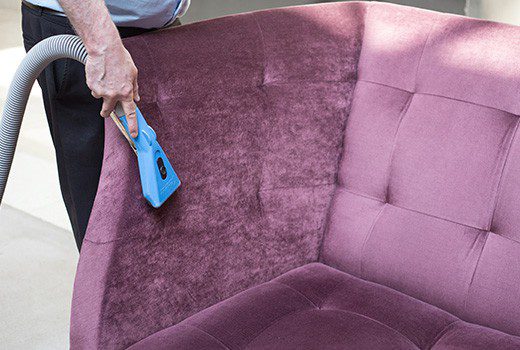
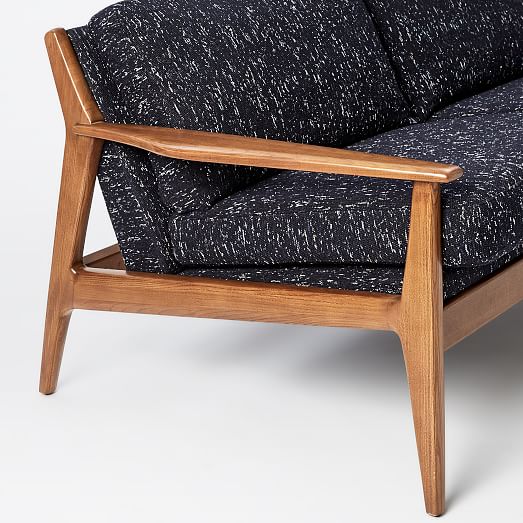
Ink Flecks
Some upholstery fabrics may contain ink flecks that have different solubilities. Some may be soluble in organic solvents, inorganic solvents, or may be insoluble.
The problem then appears after the upholstery cleaning solution is applied and the ink begins to bleed.
The only way around this again, is to pre-test the cleaning solution and reverse the reaction with the appropriate solvent.
Conclusion
It is essential to apply the science of upholstery cleaning in order to achieve safe and efficient results. Otherwise, costly mistakes could be made, especially with today’s fine furniture fabrics.
Click below to like and share if you enjoyed reading this article.
FAQs
What cleaning methods do you use?
At AJS Carpet Cleaning, we utilize various cleaning methods based on the specific needs of our customers. Some of our commonly used methods include hot water extraction (steam cleaning), dry cleaning, and encapsulation. Each method is tailored to deliver the best results for different types of carpets and upholstery.
Do you also clean area rugs and upholstery?
Yes, at AJS Carpet Cleaning, we provide cleaning services for area rugs and upholstery as well. Whether you need to freshen up your area rugs or remove stains from your upholstery, we have the expertise to handle it. Our professional team will ensure that your area rugs and upholstery are thoroughly cleaned and restored to their original beauty.
Is your cleaning process safe for pets and children?
Absolutely! The safety of your pets and children is our top priority at AJS Carpet Cleaning. We use cleaning products that are non-toxic and environmentally friendly, ensuring a safe and healthy environment for your loved ones. Our cleaning process is designed to effectively remove dirt, stains, and allergens without compromising the well-being of your pets and children. Additionally, our pet stain treatment and odor removal services are specifically tailored to address any issues related to pets.
Do you offer free estimates?
Yes, we offer free estimates for our carpet cleaning services. We understand that every cleaning job is unique, and we want to provide you with an accurate assessment of the cost. To receive a free estimate, visit our online quote and fill out the form with the necessary details. Our team will review your request and provide you with a comprehensive estimate.
Is your pricing based on the room or square footage?
Our pricing for carpet cleaning services is typically based on the square footage of the area that needs to be cleaned. This allows us to provide a fair and accurate estimate based on the size of the space. However, we also take into consideration other factors such as the condition of the carpet, the level of stains or dirt, and any additional services you may require. This ensures that our pricing is tailored to your specific needs.
Are there any additional charges that could arise?
In some cases, there may be additional charges depending on specific circumstances. For example, if there are heavily soiled areas that require extra attention, or if there are any specialized treatments needed for stains or odors, there may be additional charges. However, these additional charges are always discussed and agreed upon with the customer before any work is done. We strive to be transparent about our pricing and ensure that there are no surprises.
Do you offer any packages or discounts for multiple rooms?
Yes, we do offer packages and discounts for multiple rooms. We understand that many customers have multiple areas that need cleaning, and we want to provide cost-effective solutions. Our team can provide you with information on our current packages and any available discounts based on the number of rooms you need to have cleaned. To discuss specific pricing options and available discounts, please reach out to our team directly at 801-368-0705 or through our online quote. We’ll be happy to assist you further.
Is there an extra charge for high traffic areas?
At AJS Carpet Cleaning, we understand that high traffic areas can require additional attention and cleaning. In some cases, there may be an extra charge for cleaning heavily soiled or high traffic areas. However, the specific details and any associated charges would be discussed and agreed upon with you before any work is done. Our goal is to provide transparent pricing and ensure that you are informed about any potential additional charges. If you have any concerns about high traffic areas or would like more information, please call us at (801) 368-0705
How far in advance do I need to schedule an appointment?
We recommend scheduling an appointment with us at least 1-2 weeks in advance to secure your desired date and time. However, we understand that there may be situations where you need immediate service. In such cases, we will do our best to accommodate your needs and find a suitable time slot for your cleaning job. To schedule an appointment, visit our website online booking or contact us directly at 801-368-0705.
How long will the cleaning process take?
The duration of the cleaning process can vary depending on several factors, such as the size of the area to be cleaned, the level of dirt and stains, and the specific cleaning method used. As a general guideline, a typical carpet cleaning job can take anywhere from 1 to 3 hours. However, it’s important to note that this is just an estimate and the actual time required may vary. Our team will work efficiently to complete the job as quickly as possible while ensuring thorough and high-quality cleaning. If you have any specific time constraints or scheduling considerations, please let me know so that we can accommodate your needs.
How long will it take for the carpets to dry?
The drying time for carpets can vary depending on various factors, including the humidity level, airflow, carpet thickness, and cleaning method used. On average, carpets typically take around 4-6 hours to dry completely. However, it’s important to note that this is just an estimate and the drying time may vary. To expedite the drying process, we recommend ensuring proper ventilation in the area, using fans or opening windows if possible. Our team will also provide you with some post-cleaning tips to help speed up the drying process.
Do you offer weekend or evening appointments?
Yes, we do offer weekend and evening appointments to accommodate our customers’ busy schedules. We understand that weekdays may not always be convenient for everyone, so we strive to provide flexible appointment options. When scheduling your appointment, please let us know your preferred date and time, and we will do our best to accommodate your request. To book an appointment, you can visit our online booking or contact us directly at 801-368-0705.
Are you licensed and insured?
Yes, AJS Carpet Cleaning is a licensed and insured company. We take pride in providing professional and reliable services to our customers. Our team is fully trained and certified to ensure quality workmanship and customer satisfaction. Additionally, we carry liability insurance to protect both our customers and our employees during the cleaning process.
Do you have any industry certifications?
Yes, AJS Carpet Cleaning holds industry certifications to ensure the highest standards of quality and professionalism. Our team members are trained and certified in various cleaning techniques and methods. While we don’t have specific certifications mentioned, we continuously invest in training and staying up-to-date with the latest industry practices. This allows us to deliver exceptional results and provide our customers with the best possible service.
How long have you been in business?
AJS Carpet Cleaning has been in business since 2000, serving customers in Utah for over 20 years. Our experience and longevity in the industry are a testament to our commitment to providing high-quality cleaning services and customer satisfaction.
Do you have references or reviews I can check?
Yes, we have references and reviews from satisfied customers that you can check. We take pride in our work and value the feedback from our clients. You can visit our website at ablejan.com to find testimonials from previous customers. Additionally, you can also find reviews on our social media pages such as Facebook and Google. We strive to maintain a high level of customer satisfaction and are confident that you will find positive feedback about our services.
Do you offer a guarantee for your services?
Yes, we offer a 100% satisfaction guarantee for our services. We are committed to providing high-quality cleaning and ensuring that our customers are happy with the results. If you are not completely satisfied with our service, please let us know within a reasonable timeframe, and we will work with you to address any concerns and make it right. Your satisfaction is our priority, and we stand behind the quality of our work.
What should I do to maintain my carpet after its been cleaned?
To maintain the cleanliness and longevity of your carpet after it has been professionally cleaned, here are a few tips:
- Vacuum regularly: Regular vacuuming helps to remove dirt, dust, and debris that can accumulate on the carpet surface. Aim to vacuum at least once a week, or more frequently in high-traffic areas.
- Address spills and stains promptly: If any spills or stains occur, it’s important to clean them up as soon as possible. Blot the area with a clean cloth or paper towel and avoid rubbing, as it can spread the stain. If needed, use a mild carpet cleaner or a mixture of water and vinegar to treat the stain.
- Use doormats and shoe removal: Placing doormats at entryways can help reduce the amount of dirt and debris that gets tracked onto the carpet. Encourage family members and guests to remove their shoes upon entering to minimize dirt and stains.
- Avoid excessive moisture: Limit the amount of moisture that comes into contact with your carpet. Wipe up any spills promptly and avoid over-wetting the carpet during cleaning.
- Schedule regular professional cleanings: Periodic professional cleanings are essential to maintain the freshness and appearance of your carpet. We recommend scheduling a professional cleaning at least once every 12-18 months, or more frequently for high-traffic areas.
Following these maintenance practices will help extend the life of your carpet and keep it looking its best.
Do you offer any after care products or services?
Yes, we offer aftercare products and services to help maintain the cleanliness and condition of your carpet after it has been cleaned. Our team can provide you with recommendations for carpet spot cleaners or stain removers that are safe and effective for use on your specific type of carpet. Additionally, we can offer advice on proper cleaning techniques for addressing spills and stains.
What types of stains are you able to remove?
We are able to remove the toughest of the stains:
- Wine and Juice Stains
- Coffee Stains
- Pet Stains
- Blood Stains
- Green Tea
- Cooking Oil
- Kool-Aid
- Ink
- Glue
- Wax, Gum, Fat and Oil
- Yellow Mustard
- Nail Polish
While you can likely remove stains on your own, the challenge is doing so without damaging your expensive carpet. Call AJS Pro Carpet Cleaning for safe removal.
Do you use eco-friendly cleaning solutions?
Yes, we exclusively use commercial green carpet cleaning products formulated with natural and sustainable ingredients, ensuring safety for both the environment and human health.
How often should I clean my tile, stone and/or grout?
Cleaning frequency for tile, stone, and grout depends on the location, usage, and type of tile or stone. Here’s a general guideline:
Daily Cleaning:
- Kitchen Tiles: Wipe down kitchen tiles daily to remove grease, food splatters, and other residues. This will prevent buildup and make deeper cleaning easier.
- Bathroom Tiles: Wipe down tiles after showers or baths to prevent water spots, soap scum, and mildew buildup.
Weekly Cleaning:
- Floors: Sweep or vacuum tile and stone floors weekly to remove dirt and debris. This prevents the dirt from scratching the surface. Mop with a damp mop using a cleaner suitable for your specific tile or stone type.
- Bathroom Tiles: Clean tiles and grout with a bathroom cleaner to prevent mold and mildew buildup. Ensure good ventilation to keep the area dry.
- Kitchen Backsplash and Countertops: Clean with a mild detergent or a cleaner suitable for your tile or stone.
Monthly Cleaning:
Deep Cleaning: Depending on the traffic and usage, you might want to do a deeper cleaning of your tiles and grout monthly. This involves using a grout cleaner or a mixture of baking soda and water to scrub the grout lines.
Annually or Bi-annually:
- Sealing Grout: Grout, especially in areas like the bathroom, should be sealed to prevent moisture and stain penetration. Depending on the type of sealer used and the traffic in the area, you might need to reseal your grout every 1-2 years.
- Stone: Natural stone might require periodic sealing to protect it from stains and wear. The frequency depends on the type of stone and its location. For example, marble in a frequently used bathroom might need sealing more often than slate in a low-traffic area.
As Needed:
- Stain Removal: Attend to spills and stains immediately to prevent them from setting. Always use a cleaner appropriate for your tile or stone type. Acidic cleaners, for example, can damage natural stone like marble and limestone.
- Grout Whitening: If grout becomes discolored, you can use grout whitening products or a mixture of baking soda and hydrogen peroxide to restore its color.
Tips:
- Always test cleaning products on a small, inconspicuous area first to ensure they don’t damage or discolor the tile, stone, or grout.
- Avoid using abrasive pads on tiles and stones as they can scratch the surface.
- Ensure proper ventilation when using strong cleaning products to avoid inhaling fumes.
Remember, the key to maintaining the beauty and integrity of your tile, stone, and grout is regular cleaning and proper care.
Why should I have my upholstered furniture professionally cleaned?
Having your upholstered furniture professionally cleaned offers several benefits:
Deep Cleaning:
Professional cleaners use specialized equipment and techniques to deeply clean upholstery, removing dirt, allergens, and contaminants that regular home cleaning methods might miss.
Extended Furniture Life:
Dirt and grime can wear down and degrade upholstery fibers over time. Regular professional cleaning can help extend the life of your furniture by removing these abrasive substances.
Stain Removal:
Professionals have the tools and expertise to remove tough stains without damaging the fabric. They can identify the type of stain and the type of fabric to determine the best cleaning method.
Health Benefits:
Upholstered furniture can harbor allergens like dust mites, pet dander, and pollen. A professional cleaning can help reduce these allergens, improving indoor air quality and potentially benefiting those with allergies or respiratory issues.
Odor Removal:
Over time, upholstered furniture can absorb odors from pets, spills, smoke, and other sources. Professional cleaning can help neutralize and remove these odors, leaving your furniture smelling fresh.
Safe Cleaning Methods:
Professionals are trained to recognize different types of upholstery materials and know which cleaning methods and products are safe and effective for each. This reduces the risk of damage or discoloration.
Appearance:
Regular professional cleaning can help maintain the vibrant color, texture, and overall appearance of your furniture, making it look newer for longer.
Protective Treatments:
Many professional cleaners offer protective treatments that can be applied after cleaning. These treatments can help repel stains and spills, making future cleanings easier and extending the time between cleanings.
Saves Time and Effort:
Cleaning upholstery can be time-consuming and labor-intensive. Hiring a professional can save you the effort and ensure a thorough job.
Economic:
While there’s a cost associated with professional cleaning, it can be more economical in the long run. Maintaining your furniture in good condition might mean you don’t need to replace it as often.
Expertise:
- Professionals are trained to handle a variety of situations, from mold and mildew issues to water damage. They can provide guidance and services tailored to specific problems.
- While regular vacuuming and spot cleaning at home are essential for maintaining your upholstered furniture, periodic professional cleanings can ensure its longevity, appearance, and cleanliness.
How to get dog pee out of carpet?
Removing dog urine from carpet can be a challenge, especially if it has set for a while. However, with the right approach, you can effectively remove the stain and odor. Here’s a step-by-step guide:
Blot the Fresh Stain:
If the urine is still wet, use paper towels or a clean cloth to blot up as much of the urine as possible. Do not rub, as this can spread the urine and push it deeper into the carpet fibers.
Place a thick layer of paper towels on the wet spot and press down with your feet or place a heavy object on top to help absorb the moisture.
Prepare a Cleaning Solution:
Vinegar and Baking Soda: Mix equal parts of white vinegar and water in a spray bottle. Spray the affected area generously. Let it sit for a few minutes, then sprinkle baking soda over the area.
Commercial Enzymatic Cleaners: These are specifically designed to break down the proteins in urine, eliminating both the stain and odor. Brands like Nature’s Miracle or Simple Solution are popular choices. Always follow the manufacturer’s instructions.
Apply the Cleaning Solution:
If using the vinegar solution, after sprinkling baking soda, let it fizz and sit for a few hours or overnight if possible.
If using an enzymatic cleaner, apply as directed on the product label.
Blot and Rinse:
After the solution has had time to work, blot the area with a clean cloth to remove any excess moisture.
Rinse the area with cool water and blot again to remove the cleaning solution. This step is crucial to prevent any residue from attracting dirt in the future.
Vacuum:
Once the area is completely dry, vacuum to restore the carpet’s texture and remove any leftover baking soda or residue.
Check for Remaining Odor:
If you can still smell urine, it may have soaked into the carpet padding or even the subfloor. In such cases, you might need to treat the area multiple times or consider hiring a professional carpet cleaner.
Prevent Future Accidents:
- If your dog has an accident once, they might be inclined to return to the same spot. Clean the area thoroughly to remove any lingering scents that might attract your dog back to the spot.
- Consider using a pet repellent spray or another deterrent to keep your dog away from the area.
Remember, always test any cleaning solution on a small, inconspicuous area of your carpet first to ensure it doesn’t cause discoloration or damage.
How to get dog pee smell out of carpet?
If you’ve managed to remove the visible stain from dog urine but are still battling the lingering odor, here are some steps and methods to help you eliminate the smell:
Enzymatic Cleaners:
These cleaners contain enzymes that break down the proteins in urine, which are the primary cause of the odor. Brands like Nature’s Miracle, Simple Solution, or Rocco & Roxie are popular choices.
Follow the manufacturer’s instructions. Typically, you’ll want to saturate the area to ensure the cleaner reaches the carpet padding where urine might have soaked.
Vinegar and Baking Soda:
Mix equal parts of white vinegar and water in a spray bottle. Spray the affected area generously.
Let it sit for a few minutes, then blot up as much moisture as you can.
Once the area is mostly dry, sprinkle baking soda over it. The baking soda will help absorb and neutralize odors.
After letting the baking soda sit for a few hours or overnight, vacuum it up.
Hydrogen Peroxide:
- Mix a solution of ½ cup of 3% hydrogen peroxide, 1 teaspoon of dish soap, and 2 tablespoons of baking soda.
- Test this solution on an inconspicuous area of your carpet first to ensure it doesn’t bleach or discolor the fibers.
- Apply to the affected area and let it sit for an hour or so, then blot and rinse with water.
Professional Cleaning:
If home remedies aren’t effective, consider hiring a professional carpet cleaning service. They have specialized equipment and solutions that can deeply clean and deodorize carpets.
Odor Neutralizers:
There are commercial odor neutralizers available that can help mask and eliminate pet odors. These can be sprayed or sprinkled on the affected area.
Air Out the Room:
- Open windows and doors to allow fresh air to circulate and help dissipate the odor.
- Consider using fans to help speed up the process.
Replace the Carpet Padding:
In extreme cases where the urine has deeply soaked into the carpet padding or subfloor, you might need to replace the padding in that particular area. This is a more drastic measure but can be effective in completely eliminating deep-set odors.
Prevention:
- Train your dog to avoid accidents indoors.
- Consider using a waterproof carpet pad, which can prevent liquids from soaking through to the subfloor.
- Regularly clean and deodorize areas your dog frequents to prevent the buildup of odors over time.
Remember, always test any cleaning solution on a small, inconspicuous area of your carpet first to ensure it doesn’t cause discoloration or damage.
What neutralizes dog urine?
Dog urine can be neutralized using a combination of methods that address both the stain and the odor. Here are some substances and methods that can neutralize dog urine:
White Vinegar:
White vinegar is a natural acid that can neutralize the alkaline salts present in dried dog urine stains. Mix equal parts of white vinegar and water and apply it to the urine stain. Allow it to sit for a few minutes, then blot up the moisture.
Baking Soda:
Baking soda is an alkaline substance that can neutralize acidic components in urine. It also acts as a natural deodorizer, absorbing odors. After treating a urine spot with vinegar, sprinkle baking soda over the area, let it sit for a few hours or overnight, and then vacuum.
Enzymatic Cleaners:
These cleaners contain enzymes that break down the proteins and uric acid crystals in urine, effectively neutralizing the stain and odor. Popular brands include Nature’s Miracle, Simple Solution, and Rocco & Roxie. Always follow the manufacturer’s instructions.
Hydrogen Peroxide:
Hydrogen peroxide can help neutralize the odor of dog urine. However, it can also bleach or discolor certain materials, so always test a small, inconspicuous area first. Mix a solution of ½ cup of 3% hydrogen peroxide with a teaspoon of dish soap and apply to the urine stain. Allow it to sit for a while, then blot and rinse.
Dish Soap:
Mild dish soap can help break down the uric acid and remove the stain. It’s often mixed with other solutions, like hydrogen peroxide, for a more effective treatment.
Lemon Juice:
The citric acid in lemon juice can help neutralize the alkaline components of dog urine. Mix equal parts of lemon juice and water and apply to the stain. However, be cautious, as lemon juice can also bleach certain fabrics.
Cornstarch:
Cornstarch can help absorb fresh urine, reducing the amount of urine that needs to be neutralized. Sprinkle cornstarch over a fresh urine spot, let it sit for a few hours, then vacuum.
Water:
Rinsing the affected area with water after treating it with any of the above solutions can help wash away the urine components and any cleaning residues.
When dealing with dog urine, it’s essential to act quickly. The longer the urine sits, the harder it will be to neutralize and remove the stain and odor. Always test any solution on a small, inconspicuous area first to ensure it doesn’t cause discoloration or damage.
